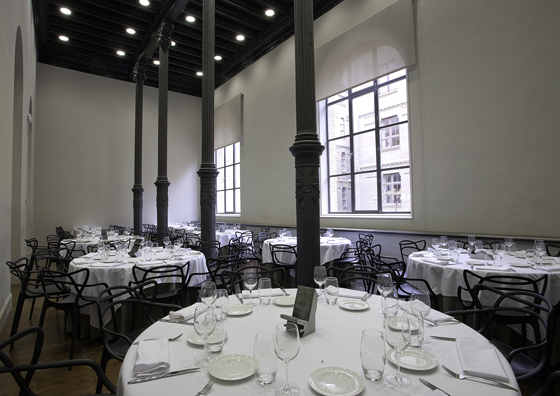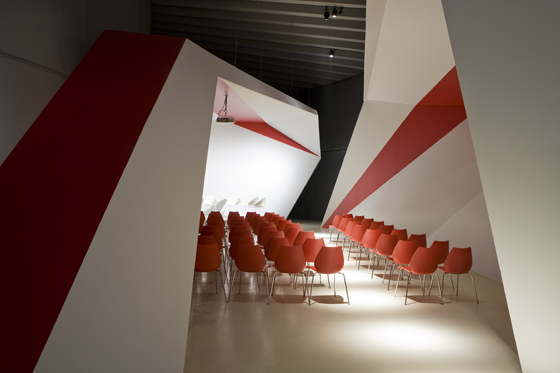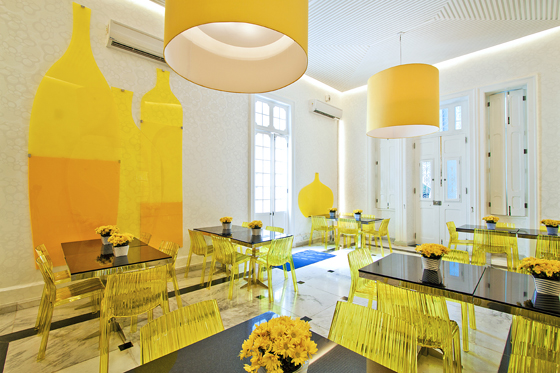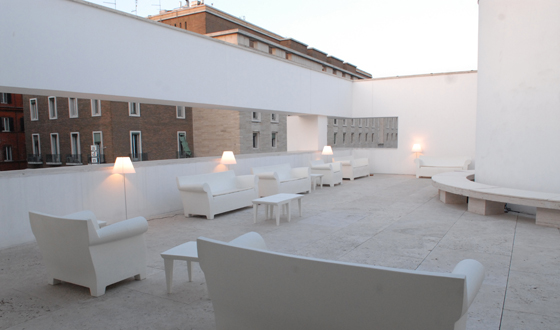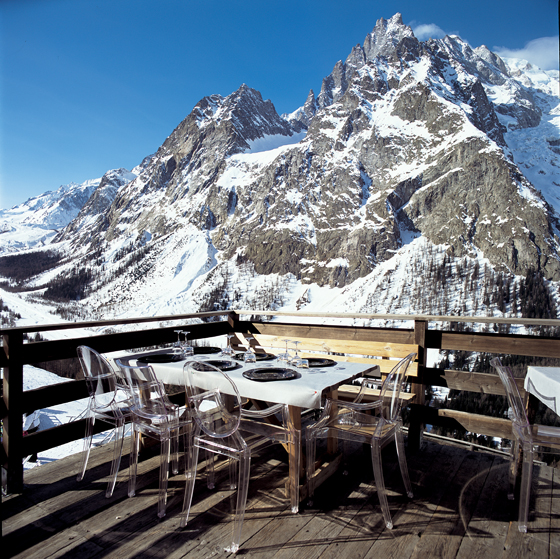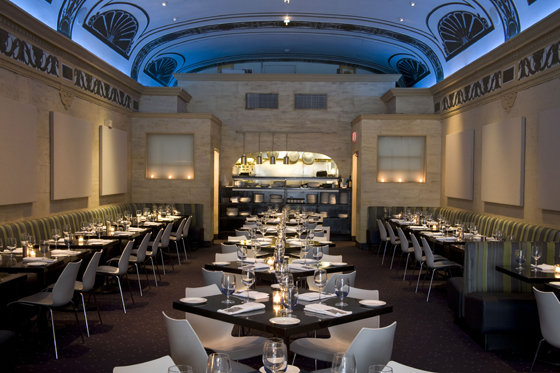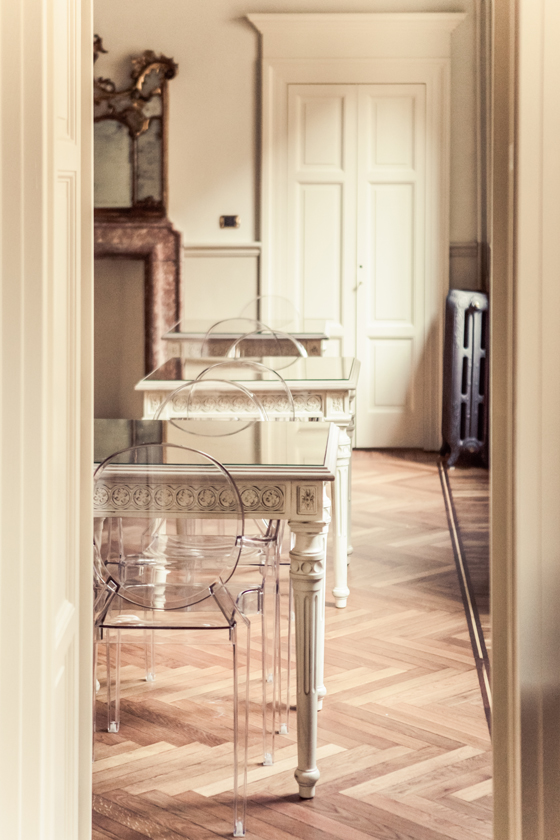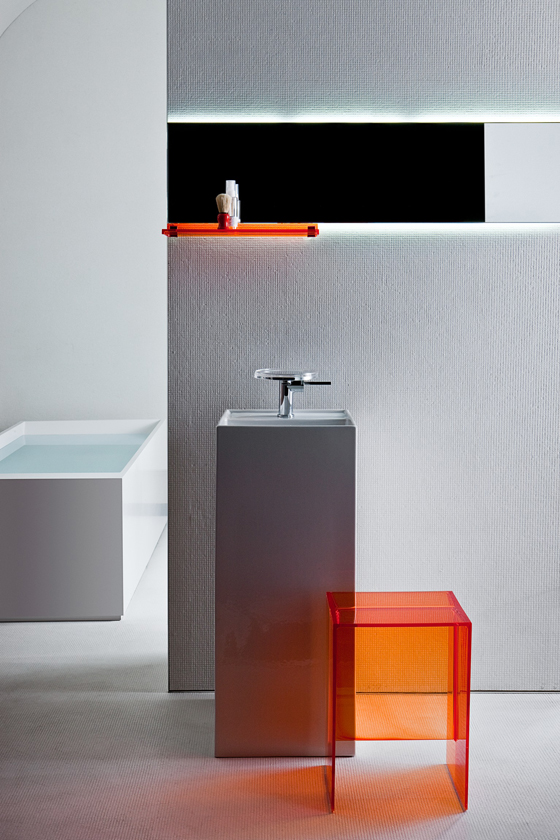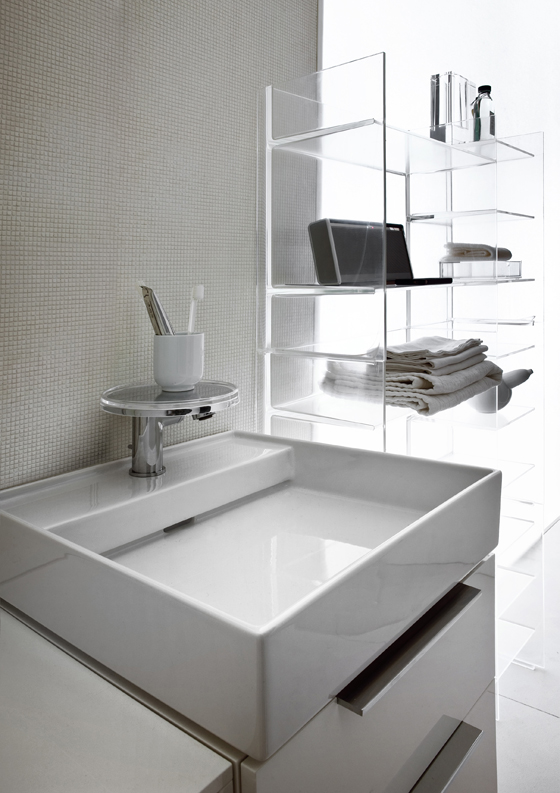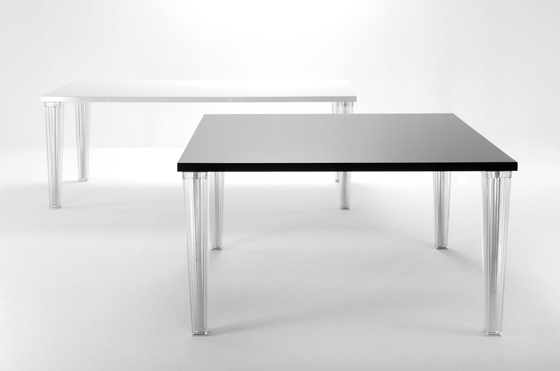Going Public
Brand story by Simon Keane-Cowell
Noviglio MI, Italie
06.01.14
Icons of the design landscape, global brand KARTELL’s products – with their innovative use of plastic and their clever and expressive, often emotional, forms – have captured the imagination of design-conscious consumers around the world. The Italian manufacturer has now set its sights on expanding its contract business, with among other moves, a dedicated new team, a post-sales follow-up service, and a new flagship-store layout concept. Kartell is out there.
Functional, architectural and supremely modular, Piero Lissoni's 'Plastics' sofa system for Kartell gets to work at Dali in Berlin

Functional, architectural and supremely modular, Piero Lissoni's 'Plastics' sofa system for Kartell gets to work at Dali in Berlin
×There’s more than a touch of modern-day alchemy about Kartell.
Nothing to do with the dark arts, you understand. Rather, it’s the way in which the leading Italian design manufacturer, in business now for over half a century, has managed to pull off a feat of transformation. It’s taken what was deemed for decades in the postwar period as a cheap, ersatz-material – plastic – and single-handedly transformed the stuff, through a steadfast commitment to material and technological innovation, into a truly aspirational design product.
Launched in 2011 and already selling 15,000 pieces a month, the expressive, Kartell-produced 'Masters' chair, designed by Philippe Starck, is ideal for contract use. Shown here, 'Masters' specified for the Universidad de Zaragoza
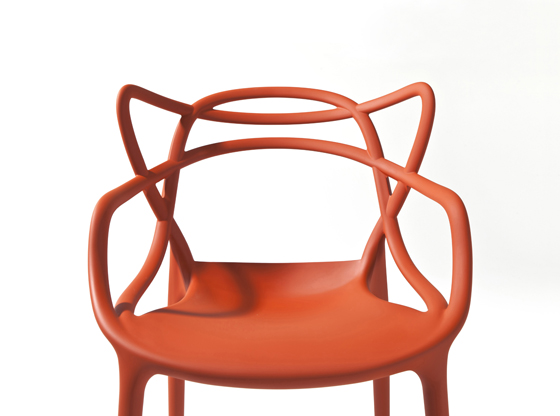
Launched in 2011 and already selling 15,000 pieces a month, the expressive, Kartell-produced 'Masters' chair, designed by Philippe Starck, is ideal for contract use. Shown here, 'Masters' specified for the Universidad de Zaragoza
×Kartell’s marketing and retail director Lorenza Luti, daughter of Kartell chief Claudio Luti, sums up the brand’s value-adding, metamorphic mission when she says ‘Our aim over the last 20 years has been to make plastic a rich material, which it wasn't before.’ With the company offering over 150 product families across two dozen product categories – from chairs and sofas to lighting, storage and a recently launched, innovative bathroom programme – and its list of collaborating designers reading like a Who’s Who of the design and architectural worlds, all of them go-to creatives, it’s safe to say they’ve achieved this.
At that temple of design, la Triennale di Milano, design legend Vico Magistretti's 'Maui' chair provides flexible audience seating (top); the upholstered version of 'Maui', shown here with castors, features fabric from Kvadrat (above)

At that temple of design, la Triennale di Milano, design legend Vico Magistretti's 'Maui' chair provides flexible audience seating (top); the upholstered version of 'Maui', shown here with castors, features fabric from Kvadrat (above)
×With over two million of Philippe Starck’s now iconic ‘Louis Ghost’ single-mould, polycarbonate chairs sold worldwide since its launch in 2002, and classic designs such as Anna Castelli Ferrieri’s beautifully reduced and supremely modular ‘Componibili’ storage units and the contemporary classic that is Ferruccio Laviani’s ‘Bourgie’ table lamp proving their credentials as long-sellers, Kartell has played a major role in shaping the landscape of the design interior for decades. More recently, Starck’s ‘Masters’ chair, launched in 2011, is already selling in high numbers – currently 15,000 pieces a month. But it’s perhaps because the brand has been so successful not only in its pioneering of high-end design in plastic, but also in understanding how to create a collection of objects that, while unified by the Kartell hallmarks of immaculate moulding and finishing, are individual pieces that aren’t governed by any overarching, singular aesthetic, that it has performed so well internationally in retail terms, eclipsing to an extent its contract business.
'Our products lend function and performance an emotional added value,' says Kartell CEO Claudio Luti. Shown here, the Hospital Santa Joana in Santos, Brazil (top), the Archivio Bertarelli in Milan (middle) and the Byblos Art Hotel in Verona (above)
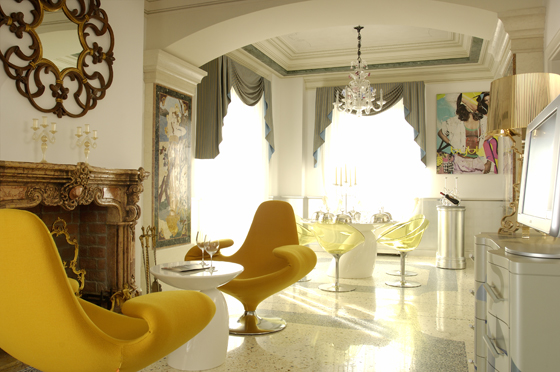
'Our products lend function and performance an emotional added value,' says Kartell CEO Claudio Luti. Shown here, the Hospital Santa Joana in Santos, Brazil (top), the Archivio Bertarelli in Milan (middle) and the Byblos Art Hotel in Verona (above)
×The versatility of Kartell’s products – with their sometimes playful, sometimes restrained, but always expressive, quality ensuring that they add value to any space in which they are placed and used – combined with the company’s truly global approach to sales and distribution has seen the Italian manufacturer establish an enviable retail presence in over 130 countries around the world with 130 flagship stores and 250 shops-in-shop. This is design democratised. Yet, as Kartell CEO Claudio Luti puts it, ‘Our contract channel has always been part of the DNA of Kartell, too.’ And it’s the DNA of the products themselves – their flexibility, comfort, material lightness, stackability, robustness, and, of course, the fact that they are industrially produced in series – that makes them ideally suited for specification in public, non-residential projects. ‘Contract is a natural consequence of our product strategy,’ explains Luti.
Kartell products have been specified internationally for exterior contract environments. Shown here, the Museo dell'Ara in Rome ('Bubble Club' sofa), Baita La Grolla in Courmayeur, Italy ('Louis Ghost' chair), and Residence Lot on Curacao ('Pop Duo' sofa)
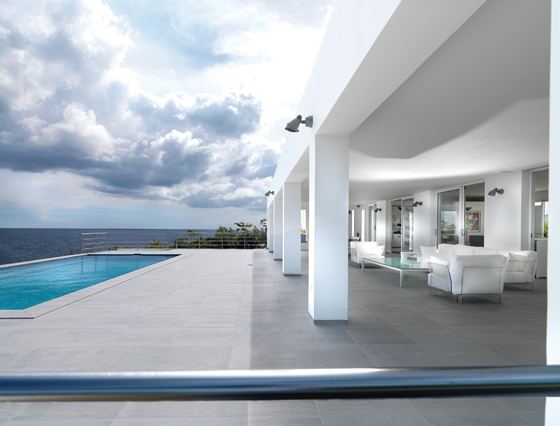
Kartell products have been specified internationally for exterior contract environments. Shown here, the Museo dell'Ara in Rome ('Bubble Club' sofa), Baita La Grolla in Courmayeur, Italy ('Louis Ghost' chair), and Residence Lot on Curacao ('Pop Duo' sofa)
×The desire to communicate with a greater clarity to architects, interior architects and designers, and planners the fitness-for-purpose of Kartell’s product offering for the contract market, married with the recognition by Luti and his team of the potential that emerging regional markets such as Asia, the Middle East, Central and South America and Africa offer in respect of a burgeoning of large-scale architectural projects (ranging from hotels and airports to hospitals, universities and conference halls) has seen Kartell, ever the alchemists, effect a transformation of an internal, organisational kind. ‘We have strengthened our contract division even further by creating a dedicated team to cover these new markets, with an appropriate customer-care follow-up service for special projects.’
Cultural spaces are just one of many types of large-scale public venue to have been given the Kartell treatment. Shown here, the Museo d'Arte di Ravenna, Italy ('Magic Hole' chair), and the Concert Hall in Thessaloniki, Greece ('Hi-Cut' chair)
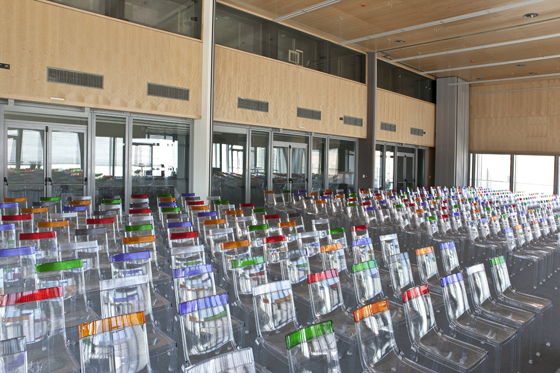
Cultural spaces are just one of many types of large-scale public venue to have been given the Kartell treatment. Shown here, the Museo d'Arte di Ravenna, Italy ('Magic Hole' chair), and the Concert Hall in Thessaloniki, Greece ('Hi-Cut' chair)
×This strategic move to raise the profile of the company’s contract business has a strong underpinning. Hundreds of new high-profile architectural projects and existing buildings internationally across a range of sectors have already elected to specify Kartell furniture and lighting to lend function and character to their interior and exterior realms. With their lightness and flexibility, and often wit (Luti prefers the adjectives ‘communicative and sexy’), Kartell chairs are a natural choice for the hospitality and gastronomy sectors, as evidenced by their installation in spaces ranging from the Byblos Art Hotel in Verona (‘Frilly’ and ‘Ero/S’ chairs) and the Elle Deco Café in Paris (‘Hi-Cut’ chair) to the Teatro restaurant in Boston (‘Maui’ chair) and London’s ‘Pret à Diner’ (‘Louis Ghost’ chair). Numerous large public spaces, such as the Concert Hall in Thessaloniki (‘Hi-Cut’ and ‘Louis Ghost’ chairs), the Universidad de Zaragoza (‘Masters’ chair), the Museo d’Arte di Ravenna (‘Magic Hole’ chair), and that most revered of spaces in terms of Italian design, the Triennale in Milan (‘Maui’ chair), have also received the Kartell treatment.
The Kartell Soft furniture family marries the company's signature pedigree plastic moulding with quality upholstery. Shown here, the Piero Lissoni-designed 'Pop' and 'Plastics Duo' sofas, the latter installed at the Calcio Catania football club, Italy
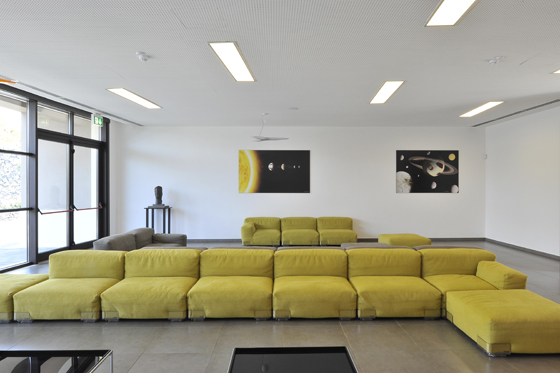
The Kartell Soft furniture family marries the company's signature pedigree plastic moulding with quality upholstery. Shown here, the Piero Lissoni-designed 'Pop' and 'Plastics Duo' sofas, the latter installed at the Calcio Catania football club, Italy
×Venture outside at the Museo dell’Ara Pacis in Rome or the Community Garden in New York and you’ll find Kartell’s ‘Bubble Club’ sofas and ‘Magic Hole’ chairs respectively giving expression and shape to their surroundings. Meanwhile, modularity is in full swing at the Calcio Catania football club in Sicily and the Hotel Cipriani in Venice, where the ‘Plastics’ and ‘Plastics Duo’ sofas have been specified to provide expansive, upholstered seating configurations. These last two products form part of the brand’s Kartell Soft furniture family, which marry its signature pedigree plastic moulding with quality upholstery to create a range of ultra-versatile sofas and lounge chairs by two of the most respected names in the contemporary design world – Piero Lissoni and Patricia Urquiola.
Teatro restaurant in Boston ('Maui' chair; top) and the Elle Deco Café in Paris ('Hi-Cut' chair; above) are just two of international projects where Kartell lives and works. Shown here also (middle), Piero Lissoni's 'Audrey' chair
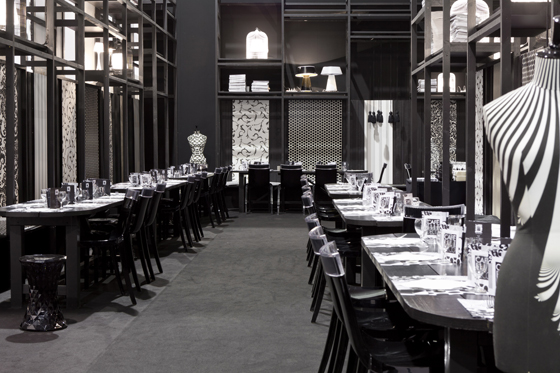
Teatro restaurant in Boston ('Maui' chair; top) and the Elle Deco Café in Paris ('Hi-Cut' chair; above) are just two of international projects where Kartell lives and works. Shown here also (middle), Piero Lissoni's 'Audrey' chair
×Another celebrated design duo, Roberto and Ludovica Palomba, were commissioned by Kartell, in collaboration with leading Swiss sanitaryware manufacturer Laufen, to create an innovative, architecturally led bathroom system, ideal for the contract market, that would draw on the key competences of both companies – Kartell’s mastery of fine plastics and Laufen’s technical expertise in high-end ceramics. The result, the Kartell by Laufen programme, is a total system of washbasins, baths, WCs, furniture, storage and accessories, which, through its emphasis on rational line and strong geometry, balanced with a considered, judicious use of colour, works to underscore and even define the interior-architectural spaces in which it is installed. Laufen’s game-changing new SaphirKeramik material, which permits for the first time ever super-thin-walled washbasins, creates alongside Kartell’s semi-transparent products a new kind of bathroom landscape, one characterised by formal and visual lightness.
With over two million pieces sold worldwide, Philippe Starck's iconic 'Louis Ghost' chair can be found at, among other places, the Ristorante Cavoli a Merenda in Milan. Also shown here, Starck's companion single-mould 'One More' bar stool
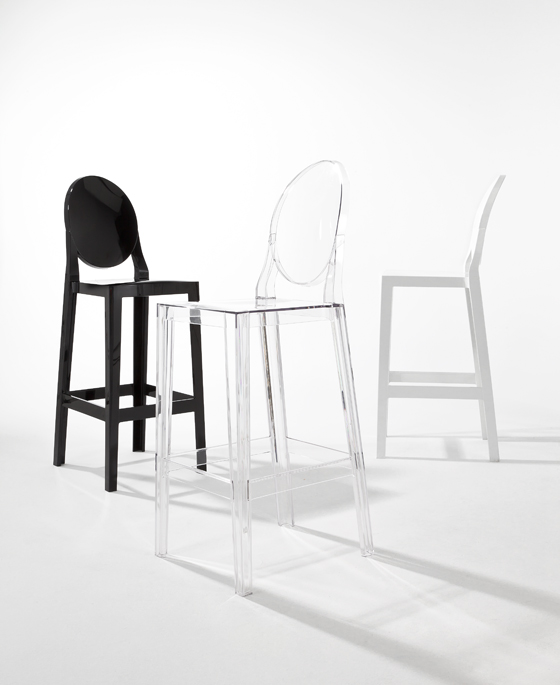
With over two million pieces sold worldwide, Philippe Starck's iconic 'Louis Ghost' chair can be found at, among other places, the Ristorante Cavoli a Merenda in Milan. Also shown here, Starck's companion single-mould 'One More' bar stool
×A joined-up bathroom programme thanks to joined-up thinking. This should come as little surprise, given that Kartell is a company that’s never lacking when it comes to strategy and the ability to see the big picture. Claudio Luti sees the company’s contract channel being aided directly by what he describes as the ‘capillary network’ of flagship stores around the world, which will serve, beyond their direct retail function, as platforms for staging the relevance and versatility of Kartell’s products for contract settings. To this end, architect and designer Ferruccio Laviani, a seasoned Kartell collaborator, has been commissioned to create an engaging new store-layout concept, which will communicate in a clear and inspiring way just how the Kartell line adds value to a range of public spaces. The stores, in this respect, play a vital role in forging stronger, longer-term relationships with clients.
Kartell’s expertise in fine plastics and leading Swiss sanitaryware manufacturer Laufen’s innovation in high-end ceramics join forces in the versatile Kartell by Laufen bathroom programme, ideal for the contract market
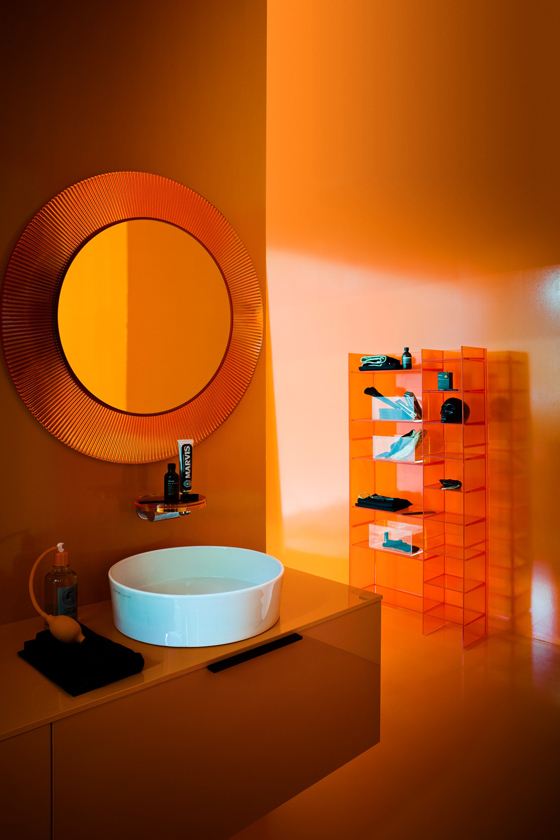
Kartell’s expertise in fine plastics and leading Swiss sanitaryware manufacturer Laufen’s innovation in high-end ceramics join forces in the versatile Kartell by Laufen bathroom programme, ideal for the contract market
×For Luti, this is an important development and one that’s completely logical. The added value Kartell products bring to the world of contract beyond their functional and performance aspects is, for him, one that’s felt on a deeply human level – emotion. ‘Of course there are many other brands that produce industrial and functional products that are able to meet all sorts of requirements of contract projects,’ Luti says. ‘What’s particular about our products is the glamour of plastic and precious materials in all sorts of colours and finishings, lent form by the most important designers in the world. It's something different and anything but boring, like the Opera in Prague furnished with transparent Louis Ghost chairs by Philippe Starck. A true vision!’
Designed by Philippe Starck with Eugeni Quitllet, Kartell's 'Top Top' dining and low tables form an essential part of the brand's contract offering
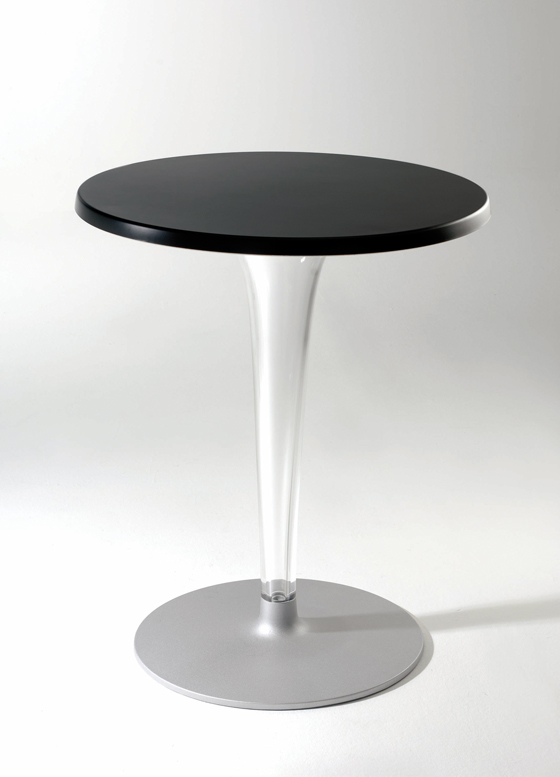
Designed by Philippe Starck with Eugeni Quitllet, Kartell's 'Top Top' dining and low tables form an essential part of the brand's contract offering
×Turning up the volume on their contract activity is just the latest initiative in Kartell’s ongoing transformative drive, one that has seen the value of plastic materials enriched, and their products, in turn, enriching the spaces into which they are used, while, at the same time, heightening our emotional responses to those very spaces. It’s a kind of magic.
Kartell CEO Claudio Luti: 'What’s particular about our products is the glamour of plastic and precious materials in all sorts of colours and finishings, lent form by the most important designers in the world'
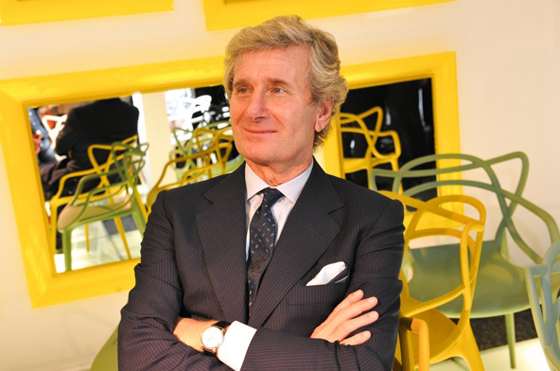
Kartell CEO Claudio Luti: 'What’s particular about our products is the glamour of plastic and precious materials in all sorts of colours and finishings, lent form by the most important designers in the world'
×....


